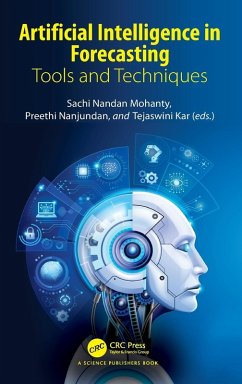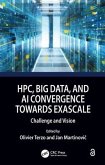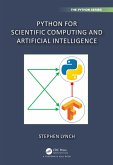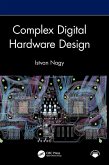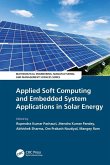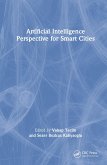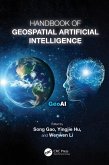Artificial Intelligence in Forecasting
Tools and Techniques
Herausgeber: Mohanty, Sachi; Kar, Tejaswini; Nanjundan, Preethi
Artificial Intelligence in Forecasting
Tools and Techniques
Herausgeber: Mohanty, Sachi; Kar, Tejaswini; Nanjundan, Preethi
- Gebundenes Buch
- Merkliste
- Auf die Merkliste
- Bewerten Bewerten
- Teilen
- Produkt teilen
- Produkterinnerung
- Produkterinnerung
Can you forecast the future value by considering historical data? Accurate forecasting requires more than just plugging in historical data into models. Readers will find the latest techniques used by managers in business today, discover the importance of forecasting and learn how it is accomplished.
Andere Kunden interessierten sich auch für
![HPC, Big Data, and AI Convergence Towards Exascale HPC, Big Data, and AI Convergence Towards Exascale]() HPC, Big Data, and AI Convergence Towards Exascale71,99 €
HPC, Big Data, and AI Convergence Towards Exascale71,99 €![Python for Scientific Computing and Artificial Intelligence Python for Scientific Computing and Artificial Intelligence]() Stephen LynchPython for Scientific Computing and Artificial Intelligence82,99 €
Stephen LynchPython for Scientific Computing and Artificial Intelligence82,99 €![Telepresence Telepresence]() Thomas B. SheridanTelepresence70,99 €
Thomas B. SheridanTelepresence70,99 €![Complex Digital Hardware Design Complex Digital Hardware Design]() Istvan Nagy (L3Harris)Complex Digital Hardware Design245,99 €
Istvan Nagy (L3Harris)Complex Digital Hardware Design245,99 €![Applied Soft Computing and Embedded System Applications in Solar Energy Applied Soft Computing and Embedded System Applications in Solar Energy]() Applied Soft Computing and Embedded System Applications in Solar Energy71,99 €
Applied Soft Computing and Embedded System Applications in Solar Energy71,99 €![Artificial Intelligence Perspective for Smart Cities Artificial Intelligence Perspective for Smart Cities]() Artificial Intelligence Perspective for Smart Cities142,99 €
Artificial Intelligence Perspective for Smart Cities142,99 €![Handbook of Geospatial Artificial Intelligence Handbook of Geospatial Artificial Intelligence]() Handbook of Geospatial Artificial Intelligence249,99 €
Handbook of Geospatial Artificial Intelligence249,99 €-
-
-
Can you forecast the future value by considering historical data? Accurate forecasting requires more than just plugging in historical data into models. Readers will find the latest techniques used by managers in business today, discover the importance of forecasting and learn how it is accomplished.
Hinweis: Dieser Artikel kann nur an eine deutsche Lieferadresse ausgeliefert werden.
Hinweis: Dieser Artikel kann nur an eine deutsche Lieferadresse ausgeliefert werden.
Produktdetails
- Produktdetails
- Verlag: Taylor & Francis Ltd
- Seitenzahl: 366
- Erscheinungstermin: 19. Juli 2024
- Englisch
- Abmessung: 240mm x 161mm x 24mm
- Gewicht: 756g
- ISBN-13: 9781032506159
- ISBN-10: 1032506156
- Artikelnr.: 70148791
- Herstellerkennzeichnung
- Libri GmbH
- Europaallee 1
- 36244 Bad Hersfeld
- gpsr@libri.de
- Verlag: Taylor & Francis Ltd
- Seitenzahl: 366
- Erscheinungstermin: 19. Juli 2024
- Englisch
- Abmessung: 240mm x 161mm x 24mm
- Gewicht: 756g
- ISBN-13: 9781032506159
- ISBN-10: 1032506156
- Artikelnr.: 70148791
- Herstellerkennzeichnung
- Libri GmbH
- Europaallee 1
- 36244 Bad Hersfeld
- gpsr@libri.de
Dr. Sachi Nandan Mohanty obtained a PostDoc from IIT Kanpur in 2019 and Ph.D. from IIT Kharagpur, India in 2015, with MHRD scholarship from Government of India. He has authored/edited over 25 books, published by IEEE-Wiley, Springer, Wiley, CRC Press, NOVA and DeGruyter. His research areas include Data Mining, Big Data Analysis, Cognitive Science, Fuzzy Decision Making, Brain-Computer Interface, Cognition, and Computational Intelligence. Prof. S N Mohanty has received 4 Best Paper awards from an International Conference at Beijing, China, and the International Conference on Soft Computing Applications organized by IIT Rookee in 2013. He has awarded Best Thesis award first prize by Computer Society of India in 2015. He has guided 9 PH.D. Scholars. He has published 120 articles in reputable journals and has been elected as FELLOW of Institute of Engineers, European Alliance Innovation (EAI), and Senior member of IEEE Computer Society Hyderabad chapter. He has served as a reviewer of Journal of Robotics and Autonomous Systems (Elsevier), Computational and Structural Biotechnology Journal (Elsevier), Artificial Intelligence Review (Springer), Spatial Information Research (Springer). Dr. Preethi Nanjundan is an Associate Professor in the Department of Data Science at Christ University, Pune, India. She received her doctorate degree (2014), Master of Philosophy in Computer Science (2014), and a master's degree in computer applications (2004) all from Bharathiyar University, Coimbatore, TN, India. Her research and teaching experience spans almost 20 years. Besides publishing over 20 papers in reputed journals, she has contributed chapters to various books and published 5 books. She has 4 patents. In 2020, she received the Best Professor award from Lead India and Vision Digital India. Her contributions to a book titled "Covid 19 and its Impact'' have been inducted into the Indian and Asian books of records. Her research area includes machine learning, natural language processing, and neural network etc. She is a lifetime member of professional societies including Computer Society of India (CSI), International Association of Computer Science and Information Technology (IACSIT), Computer Science Teachers Association, and Indian Society for Technical Education (ISTE). Tejaswini Kar received her B. Tech in Electronics and Telecommunication engineering from Biju Patnaik University of Technology, Odisha, Bhubaneswar, India in 2003. She obtained a M. Tech in communication system engineering from Kalinga Institute of Industrial Technology, in 2008 and Ph.D. degree in Electronics and Telecommunication engineering in 2018 from KIIT deemed to be university, Bhubaneswar, India. She has almost 20 years of teaching experience. She is currently an Assistant Professor with the School of Electronics Engineering, KIIT deemed to be University. She has published many research papers in important conferences and reputable journals. She has served as a reviewer in many peer reviewed journals and conferences. She received best paper award in ICDMAI 2019 held in Malaysia. She has been awarded with certificate of excellence award as a mentor by Samsung for Samsung Prism project in 2022. Her current research interests include image processing, video processing, Machine Learning and Deep Learning.
Pursuits of Forecasting: Revesting the claims of Artificial Intelligence. A
Multilayered Feed-forward Neural network architecture for rainfall
forecasting. Forecasting the Stock Market Index Using Artificial
Intelligence Techniques. Forecasting of Environmental Sustainability
through Green Innovation of E-Vehicle Industry. The Evolution of
Forecasting Techniques: Traditional Versus Machine Learning Methods.
Workforce Forecasting after COVID-19 Pandemics using Artificial
Intelligence. Gender Disparity in Artificial Intelligence: Creating
awareness of Unconscious Bias. Customer Perspective through Artificial
Intelligence: Forecasting Green Products' sustainable Development. Weather
Forecasting and Climate behavioural analysis using artificial intelligence.
Assessing Climate Change Through Ai: An Ethico-Legal Study. Workforce
forecasting using Artificial Intelligence. Artificial Intelligence-Based
Approaches for Anticipating Financial Market Index Trends. A Comparative
Analysis of Traditional and Machine Learning Forecasting Techniques.
Forecasting Demand for Paddy and Cotton in Andhra Pradesh: Empirical
Analysis using Machine Learning Models. Business Forecasting and Error
Handling Using AI. Practical benefits of using AI for more accurate
forecasting- In Mental Health. Predicting stock market indexes with
Artificial Intelligence. The intellectual structure of application of
Artificial Intelligence in forecasting methods: A literature review using
bibliometric analysis. Effective Temperature Prediction for an enhanced
Climate Forecast System. Demand Forecasting Methods: Using Machine Learning
to Predict Future Sales. Demand and Supply forecasts for supply chain and
retail. Role of Artificial Intelligence in Weather Forecasting and Climate
Behavioral Analysis.
Multilayered Feed-forward Neural network architecture for rainfall
forecasting. Forecasting the Stock Market Index Using Artificial
Intelligence Techniques. Forecasting of Environmental Sustainability
through Green Innovation of E-Vehicle Industry. The Evolution of
Forecasting Techniques: Traditional Versus Machine Learning Methods.
Workforce Forecasting after COVID-19 Pandemics using Artificial
Intelligence. Gender Disparity in Artificial Intelligence: Creating
awareness of Unconscious Bias. Customer Perspective through Artificial
Intelligence: Forecasting Green Products' sustainable Development. Weather
Forecasting and Climate behavioural analysis using artificial intelligence.
Assessing Climate Change Through Ai: An Ethico-Legal Study. Workforce
forecasting using Artificial Intelligence. Artificial Intelligence-Based
Approaches for Anticipating Financial Market Index Trends. A Comparative
Analysis of Traditional and Machine Learning Forecasting Techniques.
Forecasting Demand for Paddy and Cotton in Andhra Pradesh: Empirical
Analysis using Machine Learning Models. Business Forecasting and Error
Handling Using AI. Practical benefits of using AI for more accurate
forecasting- In Mental Health. Predicting stock market indexes with
Artificial Intelligence. The intellectual structure of application of
Artificial Intelligence in forecasting methods: A literature review using
bibliometric analysis. Effective Temperature Prediction for an enhanced
Climate Forecast System. Demand Forecasting Methods: Using Machine Learning
to Predict Future Sales. Demand and Supply forecasts for supply chain and
retail. Role of Artificial Intelligence in Weather Forecasting and Climate
Behavioral Analysis.
Pursuits of Forecasting: Revesting the claims of Artificial Intelligence. A
Multilayered Feed-forward Neural network architecture for rainfall
forecasting. Forecasting the Stock Market Index Using Artificial
Intelligence Techniques. Forecasting of Environmental Sustainability
through Green Innovation of E-Vehicle Industry. The Evolution of
Forecasting Techniques: Traditional Versus Machine Learning Methods.
Workforce Forecasting after COVID-19 Pandemics using Artificial
Intelligence. Gender Disparity in Artificial Intelligence: Creating
awareness of Unconscious Bias. Customer Perspective through Artificial
Intelligence: Forecasting Green Products' sustainable Development. Weather
Forecasting and Climate behavioural analysis using artificial intelligence.
Assessing Climate Change Through Ai: An Ethico-Legal Study. Workforce
forecasting using Artificial Intelligence. Artificial Intelligence-Based
Approaches for Anticipating Financial Market Index Trends. A Comparative
Analysis of Traditional and Machine Learning Forecasting Techniques.
Forecasting Demand for Paddy and Cotton in Andhra Pradesh: Empirical
Analysis using Machine Learning Models. Business Forecasting and Error
Handling Using AI. Practical benefits of using AI for more accurate
forecasting- In Mental Health. Predicting stock market indexes with
Artificial Intelligence. The intellectual structure of application of
Artificial Intelligence in forecasting methods: A literature review using
bibliometric analysis. Effective Temperature Prediction for an enhanced
Climate Forecast System. Demand Forecasting Methods: Using Machine Learning
to Predict Future Sales. Demand and Supply forecasts for supply chain and
retail. Role of Artificial Intelligence in Weather Forecasting and Climate
Behavioral Analysis.
Multilayered Feed-forward Neural network architecture for rainfall
forecasting. Forecasting the Stock Market Index Using Artificial
Intelligence Techniques. Forecasting of Environmental Sustainability
through Green Innovation of E-Vehicle Industry. The Evolution of
Forecasting Techniques: Traditional Versus Machine Learning Methods.
Workforce Forecasting after COVID-19 Pandemics using Artificial
Intelligence. Gender Disparity in Artificial Intelligence: Creating
awareness of Unconscious Bias. Customer Perspective through Artificial
Intelligence: Forecasting Green Products' sustainable Development. Weather
Forecasting and Climate behavioural analysis using artificial intelligence.
Assessing Climate Change Through Ai: An Ethico-Legal Study. Workforce
forecasting using Artificial Intelligence. Artificial Intelligence-Based
Approaches for Anticipating Financial Market Index Trends. A Comparative
Analysis of Traditional and Machine Learning Forecasting Techniques.
Forecasting Demand for Paddy and Cotton in Andhra Pradesh: Empirical
Analysis using Machine Learning Models. Business Forecasting and Error
Handling Using AI. Practical benefits of using AI for more accurate
forecasting- In Mental Health. Predicting stock market indexes with
Artificial Intelligence. The intellectual structure of application of
Artificial Intelligence in forecasting methods: A literature review using
bibliometric analysis. Effective Temperature Prediction for an enhanced
Climate Forecast System. Demand Forecasting Methods: Using Machine Learning
to Predict Future Sales. Demand and Supply forecasts for supply chain and
retail. Role of Artificial Intelligence in Weather Forecasting and Climate
Behavioral Analysis.

